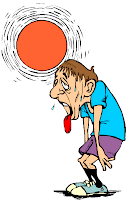Heat Alert
During weekends, I always stayed at home for relaxation and rest. But recently, staying at home makes me sick. I think Philippines is hit by a heat wave. I woke up at 9Am when I felt that the rays of the sun from the window hit my face and its like burning my skin. I went directly into the bathroom to take a shower. I felt that the water that coming from the shower is so hot. After I took off from the shower, my body feels too much heat and then I start sweating. I feel like my head is breaking due to too much heat. As of this writing my head is still aching in pain.I really think that the world is getting hotter everyday.
Almost every summer there is a deadly heat wave in some part of my country (Philippines). Too much heat is not safe for anyone. It is even dangerous if you are older or having a health problems. That's why its important to recovered from a heat quickly or you begin to feel confused and more worse than that - faint. Your heart began to beat slowly or more than that stop from beating. That's what i felt a while ago.
Some studies also said that too much heat might affect our brain which could also lead to cardiovascular or heart disease. When too heat strikes us a certain fluid cerebrum spinal fluid were affected when the body absorbed too much heat. (http://www.modernghana.com/lifestyle/1162/16/too-much-heat-can-affect-the-brain-doctor.html).
Being hot for too long can cause some illnesses. They can be grouped under the name hyperthermia (hy-per-ther-mee-uh):
Almost every summer there is a deadly heat wave in some part of my country (Philippines). Too much heat is not safe for anyone. It is even dangerous if you are older or having a health problems. That's why its important to recovered from a heat quickly or you begin to feel confused and more worse than that - faint. Your heart began to beat slowly or more than that stop from beating. That's what i felt a while ago.
Some studies also said that too much heat might affect our brain which could also lead to cardiovascular or heart disease. When too heat strikes us a certain fluid cerebrum spinal fluid were affected when the body absorbed too much heat. (http://www.modernghana.com/lifestyle/1162/16/too-much-heat-can-affect-the-brain-doctor.html).
Being hot for too long can cause some illnesses. They can be grouped under the name hyperthermia (hy-per-ther-mee-uh):
- Heat exhaustion. This is also called as Heat Prostration, the most common heat related problem. It often results from heavy physical activity in hot conditions, and not drinking enough liquids. Our body has a cooling system which is controlled by our brain. This cooling system adjust and controls the heat temperature from our body by producing sweat. With this illness, the body is not working properly which leads to too much body temperature.Normal body temperature for an adult is generally 37 degrees Celsius, or 98.6 degrees Fahrenheit. With heat exhaustion, body temperature is usually between 37 to 40 degrees Celsius (98.6 to 104 degrees Fahrenheit). It has been said that heat exhaustion may damage cell and will result to dehydration. As the body temperature increases and affects your brain, heat exhaustion can lead to heatstroke.
- Heat cramps. It is the painful tightening of muscles in your stomach area, arms or legs, usually occurs during exercise or working in a hot environment.Heat cramps usually involve the muscles fatigued by heavy work such as calves, thighs, abdomen, and shoulders. While your body temperature and pulse usually stay normal during heat cramps, your skin may feel moist and cool. Take these cramps as a sign that you are too hot — find a way to cool your body down. Be sure to drink plenty of fluids, but not those containing alcohol or caffeine.
- Heat Syncope. This is a sudden dizziness that may come on when you are active in the heat. The basic symptom of heat syncope is a body temperature above 40°C (104°F) with fainting, or without mental confusion, which does occur in heat stroke. Heat syncope is caused by mild overheating with inadequate water or salt. In young persons, it is far more common than true sunstroke. (http://en.wikipedia.org/wiki/Heat_syncope).
- Heat Stroke. Heat stroke is a form of hyperthermia, an abnormally elevated body temperature with accompanying physical and neurological symptoms. Unlike heat crampsheat exhaustion, two forms of hyperthermia that are less severe, heat stroke is a true medical emergency that can be fatal if not properly and promptly treated. and
Who is at risk?
- Every might be affected from this. But normally children under 5 years of age and older adults are at great ricks specially those who cant take too much heat, like the heat exhaustion
- People with heart conditions and high blood
pressure may be affected more by the heat than others.
Treatment
It's vital that you find a way to cool yourself down---without overdoing it, such as immersing yourself in ice-cold water.
Whatever activity you are doing should be stopped. Go to a cool place such as an air-conditioned room or in shade. Lie or sit with your feet elevated. If you are wearing extra clothing such as sports equipment, remove it. Drink some cool, non-alcholic liquid. Apply a cool cloth or towel to your skin.
It's vital that you find a way to cool yourself down---without overdoing it, such as immersing yourself in ice-cold water.
Whatever activity you are doing should be stopped. Go to a cool place such as an air-conditioned room or in shade. Lie or sit with your feet elevated. If you are wearing extra clothing such as sports equipment, remove it. Drink some cool, non-alcholic liquid. Apply a cool cloth or towel to your skin.



Comments
Post a Comment